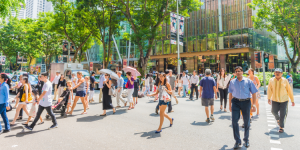
Today, more and more people have not only the opportunity but also the desire to live abroad. But as you make such a bold decision, you will face various challenges — one of the most important of which will be managing your expenses overseas.
The cost of living in your new destination will be the critical factor that will affect your experience. It can also fluctuate significantly between different countries, cities, and, sometimes, even neighborhoods. There are a myriad of factors that may affect the costs of living, from politics to currency fluctuations. It's essential for expats to be fully aware of the local economic environment and the effect they will have on their financial security, their overall living standard, and the viability of a long-term move.
In one place, a budget that can support a decent existence may not even cover the most basic needs in another, or it may even provide beyond-the-belief extravagance. This discrepancy emphasizes the importance of extensive study and budget before moving across international borders.
The goal of this article is to examine how a given budget—let's use $3,000 a month as an example—may translate into radically different lifestyles in different countries.
Understanding the cost of living
The cost of living is the amount of money you will need to pay for necessities like housing, food, healthcare, transportation, and taxes. However, it's also a more complex notion and is a crucial indicator that people use to determine how affordable it is to maintain a particular lifestyle in various places:
- The biggest outlay, housing, might differ greatly depending on whether a person chooses to live in a city center or a suburban area.
- Food costs also vary according to regional farming methods, import prices, and eating customs.
- The accessibility of services, the state of the local healthcare system, and the necessity of private health insurance all affect how much healthcare costs.
- Fuel prices, the need for a vehicle, and the availability and effectiveness of public transportation all affect travel costs.
- Additionally, utility costs, educational expenses, and taxes also contribute to the overall cost of living, making it a comprehensive indicator of economic requirements.
When evaluating your financial prospects of living in a particular destination, it's best to look at your standard cost of living report and into the purchasing power parity.
Instead of relying solely on nominal exchange rates, the economic theory known as purchasing power parity (PPP) takes inflation rates and the relative cost of living into account to provide a more realistic comparison of living standards between countries.
PPP gives a more accurate idea of how much money will go in certain situations by calculating the amount needed to buy the same goods and services in two distinct countries. This method can help expats better manage their expectations and budget by providing a clearer picture of how their income or savings can fit into the economy of a new country.
For the purposes of this article, we will take a sample monthly budget of $3,000 and explore how this amount could support various lifestyles around the world. This figure is chosen as it represents a middle-income budget in many Western countries, allowing for a comprehensive analysis of its purchasing power across different global regions.
By examining how this budget plays out in terms of housing, food, healthcare, and other essential costs in diverse locales, we can uncover insights into the economic dynamics at play and how they influence the expatriate experience.
Countries with a high cost of living
Switzerland
Switzerland is renowned for its high quality of life, but it also ranks as one of the most expensive countries in the world.
- Housing: In Switzerland, the average rent for a one-bedroom apartment in the city center can range significantly, but it is not uncommon to see prices going way above 2,000 CHF (approximately USD 2,200) per month. The same-sized apartment on the outskirts might cost less — 1,500 CHF (approximately USD 1,650) per month.
- Daily expenses: Grocery shopping and dining out in Switzerland can be quite expensive, with basic groceries for a month possibly reaching around 600 CHF (approximately USD 660), and a single meal at a mid-range restaurant often costing about 25-30 CHF (approximately USD 27-33) per person. Utilities for a standard apartment can add an extra 200 CHF (approximately USD 220) per month.
- Quality of life: Switzerland offers exceptional healthcare, education, and public services. The country's healthcare system is also known to be among the best globally, even though mandatory health insurance does get costly. Education in public establishments tends to be accessible and of high quality. However, opting for a private international school can be expensive.
Vivienne moved to Switzerland from China in 2019 and stayed in the country throughout the COVID-19 pandemic. With the unforeseen expenses that the situation brought on, she found herself struggling with her day-to-day expenses: ”Switzerland is a very expensive country, especially if you don't have the same benefits as the country's residents with healthcare and education. I work freelance, and with interruptions at work caused by the pandemic, I must admit that even everyday shopping got challenging for me at one point. I would recommend this Switzerland for those with substantial savings or a high and steady income."
New York City, USA
New York City is another location known for its exorbitant cost of living, starkly contrasting the lifestyle a $3,000 monthly budget could afford elsewhere.
Housing: Renting a small one-bedroom place in New York's city center can easily cost upwards of $3,000 per month — basically taking up your entire sample budget. If you are willing to travel out to the more distant boroughs, you may find more affordable options — but even these often exceed $2,000 per month for a one-bedroom apartment.
Daily expenses: Basic groceries and dining out in New York City can quickly add up, with monthly groceries costing at least $400 for standard items. Eating out at a mid-range restaurant will set you back around $20-30 per meal. Utilities, including electricity, heating, cooling, and internet, can average around $150-200 per month.
Quality of life: New York City offers unmatched access to professional, educational, cultural, and recreational opportunities. The healthcare system in the city is robust, with numerous top-rated hospitals and clinics. However, it does come with the same challenges that American healthcare faces in general, including expensive insurance and high treatment costs. Public education in the city varies significantly by district, with some of the best and worst schools in the country.
Overall, a budget of $3,000 won't get you far in countries like Switzerland or cities like New York. This budget is barely sufficient to cover basic living expenses, especially for expats who prefer to live in the city center. Housing would take up a significant portion of the budget, leaving little room for savings, leisure, or even the emergency fund. Daily expenses, while manageable, would require careful budgeting, especially for dining out and entertainment.
Countries with a moderate cost of Living
Southeast Asia and Eastern Europe offer an interesting contrast to the high-cost locations we've discussed above. Countries like Thailand and Malaysia in Southeast Asia, and Poland and the Czech Republic in Eastern Europe offer an appealing blend of affordability and quality living.
Thailand
Thailand is a popular destination for expats seeking a balance between cost and lifestyle. It used to be the country of backpackers and those looking to downshift. Today, the cost of living has gone up substantially — but it is still known to provide expats with a comfortable lifestyle at affordable prices. But let's take a closer look.
- Housing: A one-bedroom apartment in the city center of Bangkok can go for anything from 10,000 to 100,000 THB (approximately $300 to $3,000) per month, while similar accommodations outside the city center are available for 5,000 to 20,000 THB (approximately $150 to $600 per month). Then again, many expats coming to Thailand often look to settle away from crowds and navigate towards smaller islands and rural areas.
- Daily expenses: Groceries for a month can be managed within 6,000 to 8,000 THB (approximately $180 to $240), and dining out is relatively inexpensive, with a meal at a local restaurant costing around 50 to 200 THB ($1.50 to $6) — but, of course, there are also more expensive options. Utilities for one month can run around 2,000 to 3,500 THB ($60 to $105) for a standard apartment.
- Quality of life: Thailand offers a high quality of life, with access to excellent healthcare and a variety of international schools. The country is also known for its energetic culture, beautiful landscapes, and warm climate, making it an attractive destination even on a budget.
Leonard has lived in Thailand since 2018 and has seen the cost of living in the country go up firsthand. “I remember coming to Thailand for vacation before I moved out. I could easily manage a whole month for under $500. Now, I spend five times that amount living in Phuket."
Poland
Poland is a good example of a European country with a moderate cost of living and a high level of comfort.
- Housing: A one-bedroom apartment in the city center of major Polish cities can range from 2,000 to 3,500 PLN (approximately $500 to $900) per month, with cheaper options available outside city centers for around 1,500 to 2,500 PLN ($380 to $630).
- Daily expenses: Monthly groceries in major cities in Poland can cost around 600 to 800 PLN ($150 to $200), while eating out at a mid-range restaurant may cost about 40 to 60 PLN ($10 to $15) per meal. Utilities for a standard apartment are typically around 400 to 600 PLN ($100 to $150) a month.
- Quality of life: Poland, just like most other European countries, has a sound healthcare system, offers high-quality education options, and a rich cultural scene. Many cities in Poland offer a blend of modern amenities and historical charm and create a comfortable and engaging environment for expats.
Overall, even though the prices in both locations above have increased, a monthly budget of $3,000 per month will still let most expats enjoy a very comfortable lifestyle. This amount of money will allow you to live in a well-located apartment, enjoy a variety of local and international cuisine, and engage in leisure activities with room to save. In Thailand, the favorable climate, beautiful beaches, and vibrant street life add to the allure of living well for less. In Poland, the rich history, culture, and easy and cheap access to Europe's vast travel network present a unique living experience.
Countries with a low cost of living
If we take the same budget of $3,000 and take it to a country with a low cost of living, you may find yourself living a very comfortable lifestyle — in some destinations, even luxurious.
For this purpose, let's take a look at Colombia and Ecuador in South America and Kenya and Morocco in Africa. These countries are known for their affordable living costs combined with rich cultural experiences and beautiful landscapes.
Colombia
Colombia may not be on the list of the top-rated expat destinations (and there are surely reasons for that) — but if you are looking to consider the advantages of this destination, it comes with a mix of vibrant cities, serene countryside, and affordable living.
- Housing: Renting a one-bedroom apartment in the city center of major Colombian cities can range from $200 to $500 per month, while similar accommodations outside central locations may cost between $150 and $400.
- Daily expenses: Groceries for a month can generally be budgeted around $150 to $250, and dining out is quite affordable, with a meal at a local restaurant often costing $3 to $7. Utilities for a standard apartment are relatively low, around $50 to $70 per month.
- Quality of life: One of the primary concerns for expats moving to Columbia would be safety. However, there have been substantial improvements in this area over the past several years. Moreover, the infrastructure in many Colombian cities has also undergone positive change.
Kenya
Kenya is known for its breathtaking landscapes and wildlife. However, while most travelers look at Kenya as a destination for short-term expeditions, it doesn't present interesting opportunities when it comes to expat life.
Housing: In Kenya, a one-bedroom apartment in the city center can cost between $250 to $500 per month, while outside the city center, the price can range from $150 to $350.
Daily expenses: The cost for monthly groceries can range from $100 to $200, with dining out at a local restaurant costing around $5 to $10 per meal. Utilities for a month can average between $30 and $50 for a standard apartment.
Quality of life: Kenya offers access to incredible natural beauty, including beaches and wildlife reserves. Healthcare quality can vary, with better services available in major cities like Nairobi. The country is also home to a growing expat community attracted by its warm climate and friendly locals.
Morocco
Morocco is a country known for its rich history and vibrant culture. However, it also offers a very affordable cost of living.
- Housing: Renting a one-bedroom apartment in the city center is generally between $250 to $400 per month, and you will find even lower prices with outside the city centers (about $150 to $300).
- Daily expenses: A month's worth of groceries can cost between $100 to $200, and a meal at a mid-range restaurant could be around $5 to $10. Utilities for a standard apartment typically run from $30 to $60 per month.
- Quality of life: Morocco offers a unique blend of cultures, historic sites, and landscapes from mountains to desert to coastline. The healthcare system is improving, but most expats would find private healthcare more accommodating.
Sofia has family in Morocco and visits them for a few weeks every year, traveling from her full-time base in Tokyo. “Every time I visit, I am very aware of how much cheaper everything is compared to Japan. If I could live in Morocco on my Tokyo salary, I'd be very happy. But in Tokyo, I live in a tiny one-bedroom while working almost 60 hours a week”.
Overall, a $3,000 monthly budget in places like Colombia, Kenya, and Morocco can go a long way. This amount of money will allow you to travel, live in a nice apartment, dine out frequently, and even hire help (such as housekeeping). Alternatively, you can also use the extra money for savings or investment.
Tips on budgeting abroad for expats
It takes careful planning and continuous management to navigate the financial aspects of living abroad, particularly when adjusting to new cost-of-living conditions. Here are a few helpful pointers.
Set up a budget for different cost-of-living situations
A successful expat experience necessitates being aware of and ready for the variations in the cost of living. Start by being familiar with the typical living expenses in your new country, including those for accommodation, utilities, groceries, travel, and entertainment. Using this information, create a detailed budget that accounts for your expected income and out-of-pocket costs. Make sure to take your savings goals into account.
It is generally beneficial to overestimate your potential expenses to avoid getting into debt. You should also be prepared to make adjustments as you settle and become more experienced with local prices and ways to save.
Acquire local knowledge
Acquiring local knowledge is crucial for budget optimization abroad. Make sure to check with locals as well as long-term expats on how to cut costs, including where to go for reasonably priced retail, how to use public transport effectively, and which local services are the best value.
Accepting lifestyle changes can also have a big effect on your financial health. For instance, instead of living in an expat-oriented compound, you may want to consider looking into "standard" accommodation options that reflect local living.
Use available financial resources for foreigners
Making use of information and tools for financial planning can make managing your budget in a new place substantially easier. There are lots of applications (such as Expensify, Mint, and You Need A Budget (YNAB)) and web-based tools available for monitoring spending, managing your funds, and even managing exchange rates.
Moreover, seeking the counsel of a financial advisor with experience in managing finances for expatriates can help you get tailored recommendations and approaches for handling taxes, retirement funds, and international investments.



















